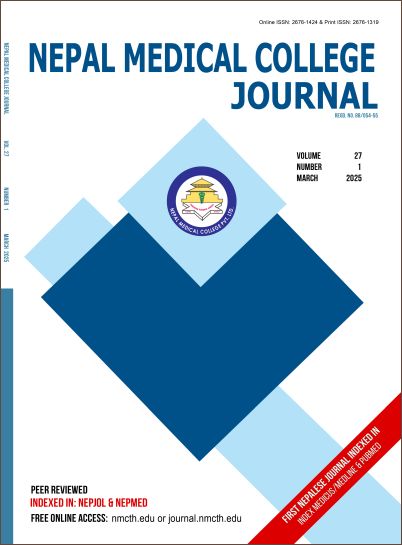Knowledge and Attitude of the Principles and Practices of Orthodontic Treatment among General Dentists and Non- Orthodontic Dental Specialists
DOI:
https://doi.org/10.3126/nmcj.v27i1.77541Keywords:
Attitude, Knowledge, Orthodontic treatment, questionnaireAbstract
Malocclusion is one of the important oral health problems among children and adults. It can cause unaesthetic facial appearance, psychological problem due to low self-esteem, increased caries prevalence, chronic gingivitis and periodontitis, temporomandibular joint disorder, chewing and speech problems. It is very important to identify and treat malocclusion early, as it helps to reduce the severity of malocclusion and skeletal discrepancy. General dental practitioners usually decide whether, when and where to refer the patients as they are considered to be gatekeepers for specialist dental care. The knowledge about the basic principles and practices of orthodontics by general dentists and non-orthodontic specialties would help to make their patients aware of the condition that would help to make their appropriate referral. The aim of this study is to determine and evaluate the knowledge and attitude of general dentists and non-orthodontic specialists towards orthodontic treatment. It is a cross-sectional, descriptive study in which a questionnaire form was used; each consisting of twenty-nine items was circulated using google form. The responses were collected, coded and analyzed to assess the knowledge and attitude scores. Data was entered and statistical analysis was performed. Majority of the respondents were of age group 30-40 years 135 (43.4%), with predominance for females 193 (62.1%). Majority were specialists 157 (50.5%) and work experience of 2-6 years 128 (41.2%) had higher predominance. Mean knowledge score was found to be significantly higher in female (13.24±1.29) than in male (12.79±1.53) and mean attitude score was also significantly higher in female (5.37±0.80) than in males (5.12±0.91). The general dentist and non-orthodontic specialists need to update their knowledge on orthodontic treatment, so that it would help them in proper patient counseling and referral.
Downloads
Downloads
Published
How to Cite
Issue
Section
License
Copyright (c) 2025 Nepal Medical College Journal

This work is licensed under a Creative Commons Attribution 4.0 International License.
This license enables reusers to distribute, remix, adapt, and build upon the material in any medium or format, so long as attribution is given to the creator. The license allows for commercial use.




